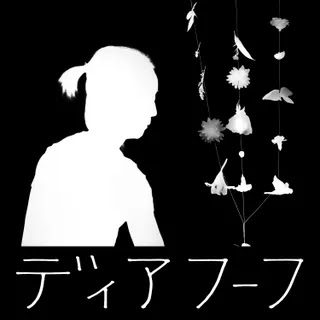Recorded in single takes with minimal overdubs, the San Francisco band’s latest album—its first sung entirely in Satomi Matsuzaki’s native Japanese—is a confident set of small epiphanies.
Since forming almost three decades ago in pre-dotcom San Francisco, Deerhoof have been some of indie rock’s most effective ambassadors for the power of anarchic creativity. A sense of mischievous delight is never far from the controlled chaos of their intricate melodies, zig-zagging rhythms, and unpredictable song structures, whose admirers have included Radiohead and ?uestlove as well as not-so-famous kindred spirits like John Dwyer and Wendy Eisenberg. Nowadays scattered across different cities, the current quartet, intact since 2008—bassist/singer Satomi Matsuzaki, drummer Greg Saunier, and guitarists Ed Rodriguez and John Dieterich—has continued to gamely experiment without losing that prankster merriment, whether espousing radical change, going full concept record, or ushering in multi-genre collaborators.
Deerhoof are at both their most whimsical and most energetically approachable on Miracle-Level, their 19th LP. Billed as the first Deerhoof album written entirely in Matsuzaki’s native Japanese, it is also the first to be recorded from start to finish in a proper studio. The album was produced by Mike Bridavsky, better known as the “dude” of the late online-celebrity cat Lil Bub, but Deerhoof’s air-quotes “studio debut” doesn’t so much smooth their scruffy charm as sharpen it up. Concentrating only on songs that could be done in one live take, with minimal overdubs but ridiculously lavish guitar textures, it’s a confident set of tiny epiphanies.
Swapping languages opens up new realms of expression. For listeners who don’t speak Japanese, Matsuzaki’s titular entreaty at the start of opening track “Sit Down, Let Me Tell You a Story.” isn’t that much less intelligible than the nonsensical playing-cards references on 2003’s “Dummy Discards a Heart” or surreal vegetable imagery that kicked off the last album, 2021’s Actually, You Can. Yet the feline exuberance of Lil Bub-dedicated “My Lovely Cat!” leaps over any linguistic barriers—particularly given the universality of terms like “Instagram” and “TikTok.” Sitting down with a translation nicely focuses the listening experience while uncovering deliciously absurd Easter eggs: What a joy to find that, amid the Latin-jazz organ groove of “The Little Maker,” Matsuzaki sings, “Doesn’t this song sound different from usual Deerhoof?” Sort of!
The band’s sound here is a live-wire version of whatever “usual Deerhoof” might be, with plenty of space to breathe and an overwhelming illusion of being in the room with them for every herky-jerk start and stop. “Everybody, Marvel,” which benefits from lyrical cognates (“records” sounds almost the same in both languages), is stunning dream pop that somehow name-checks Eurythmics. The marching-clown clamor of “Momentary Art of Soul!,” which at around five minutes is the longest song on the album, feels like it could go on forever; it locks into a teetering polyrhythm that evokes the giddy transcendence of artists as variously virtuosic as Horse Lords, Mdou Moctar, and Xylouris White.
Miracle-Level is no less captivating when Deerhoof take their feet off the gas. The coruscating undulation of “The Poignant Melody” wouldn’t be out of place on a recent Jeff Parker album; it helps that the phrase “melody” is another close cognate, and it helps even more that the translation attributes to ’70s shlock rockers Journey the idea that a melody needs to mean something: “But what does it mean, this melody?” Any way you want it, Neal Schon. Tender finale “Wedding, March, Flower,” a keyboard-based ballad that tasks drummer Greg Saunier, this time, with singing a non-native language—his vocals are in Japanese too—is genuinely moving: “Let’s walk closely together/Let’s live/I can hold an umbrella for you for a long time,” the English translation of the lyrics concludes.
The idea of miracles recurs across Matsuzaki’s lyrics. The clapping, swaying title track proclaims that “we need only ‘love’ songs,” but this is no ordinary love: “I’m talking high-level!/I’m talking religion-level!/I’m talking miracle-level.” The mesmerizing, convulsive “And the Moon Laughs” begins with a light-hearted nod to “non-drinking teens [who] compete/Shaking butts at cell-phone,” but soon becomes a terse parable for an age of disenchantment: “Non-miracle said:/That’s not my problem. I give nothing./ Well, I am not your slave. Become ice-cream then!” With bass synth, cowbell, and circuitous twists and turns, “Phase-Out All Remaining Non-Miracles by 2028” calls for the magical-realist goal it states in its title, but ends on a fantastically optimistic note for humanity: When it comes to “non-miracles,” the translated lyrics read, “Luckily there aren’t that many.”
Miracle-Level celebrates the heady euphoria that can result when skill and craft meet with serendipity and happy accidents, like a long-running indie band teaming up with the former owner of Lil Bub and hustling out a full album in two weeks’ studio time. “The idea that an artist even knows what they’re doing … I think it’s a lie,” Saunier said in a recent podcast interview. “It’s an illusion that we tell ourselves for the purpose of making selling the record easier. We dumb it down to a blurb.” A melody doesn’t have to have a meaning, it just is. Or, as Saunier told another recent interviewer, “Generosity, creativity, and love are just as much human nature as competition, coercion, and brutality.” Do you believe in miracles? No? Become ice cream then.



0 comments:
Post a Comment